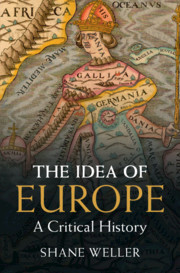Book contents
- The Idea of Europe
- The Idea of Europe
- Copyright page
- Contents
- Acknowledgments
- Introduction
- Chapter 1 Myths of Europa: From Classical Antiquity to the Enlightenment
- Chapter 2 A Great Republic of Cultivated Minds: 1712–1815
- Chapter 3 Nationalism and Universalism: 1815–1848
- Chapter 4 The Russia Question
- Chapter 5 Homo Europaeus: 1848–1918
- Chapter 6 The European Spirit: 1918–1933
- Chapter 7 A New European Order: 1933–1945
- Chapter 8 Unity in Diversity: 1945–1989
- Chapter 9 Other Europes
- Chapter 10 Europe against Itself: 1989 to the Present Day
- Conclusion Good Europeans?
- Notes
- Bibliography
- Index
Chapter 4 - The Russia Question
Published online by Cambridge University Press: 14 May 2021
- The Idea of Europe
- The Idea of Europe
- Copyright page
- Contents
- Acknowledgments
- Introduction
- Chapter 1 Myths of Europa: From Classical Antiquity to the Enlightenment
- Chapter 2 A Great Republic of Cultivated Minds: 1712–1815
- Chapter 3 Nationalism and Universalism: 1815–1848
- Chapter 4 The Russia Question
- Chapter 5 Homo Europaeus: 1848–1918
- Chapter 6 The European Spirit: 1918–1933
- Chapter 7 A New European Order: 1933–1945
- Chapter 8 Unity in Diversity: 1945–1989
- Chapter 9 Other Europes
- Chapter 10 Europe against Itself: 1989 to the Present Day
- Conclusion Good Europeans?
- Notes
- Bibliography
- Index
Summary
One of the abiding questions in the discourse on the idea of Europe since the Enlightenment has been whether Russia belongs within European civilization, or is essentially Asiatic. Following Peter the Great’s attempts to Europeanize Russia at the end of the seventeenth and in the early years of the eighteenth century, culminating in the construction of St Petersburg as a European city, Russia’s relation to (the rest of) Europe became a hotly disputed question both within and beyond Russia when Peter Chaadayev published his Philosophical Letters (1826–31), in which he claimed that Russia lacked all the qualities of a European nation. This led to a long-lasting debate between Westernizers and Slavophiles in Russia, culminating in the profoundly Slavophile views of Fyodor Dostoevsky, who took issue in particular with the Westernizing views of Ivan Turgenev. Russia’s relation to Europe was also explored by Western European writers, including Germaine de Staël and Astolphe de Custine. This Western European vision of Russia was often profoundly negative, with Russia being seen as an Asiatic threat to Europe. Chapter 4 explores this enduring debate on Russia’s relation to (the rest of) Europe, one that continues to this day.
- Type
- Chapter
- Information
- The Idea of EuropeA Critical History, pp. 94 - 113Publisher: Cambridge University PressPrint publication year: 2021

